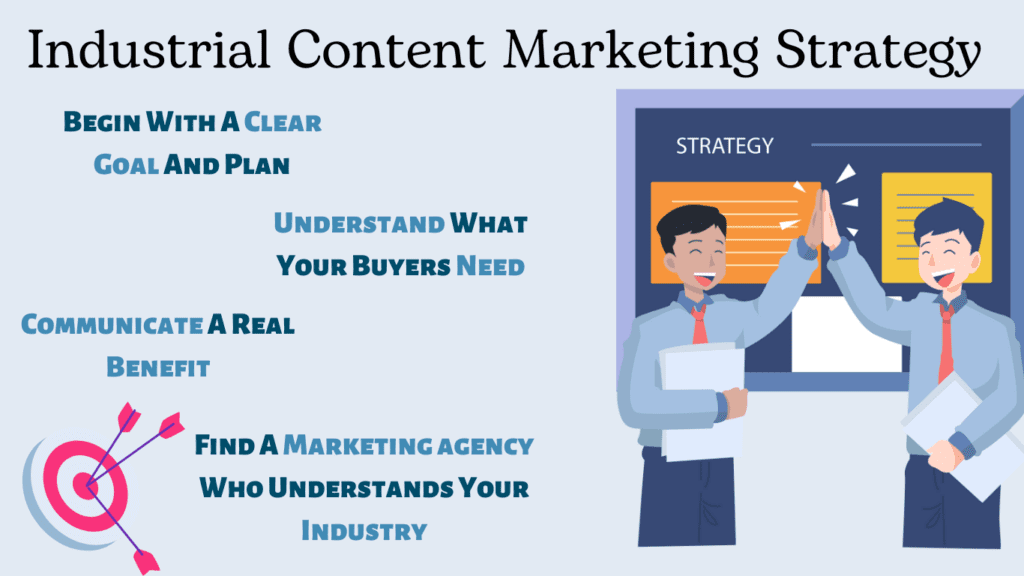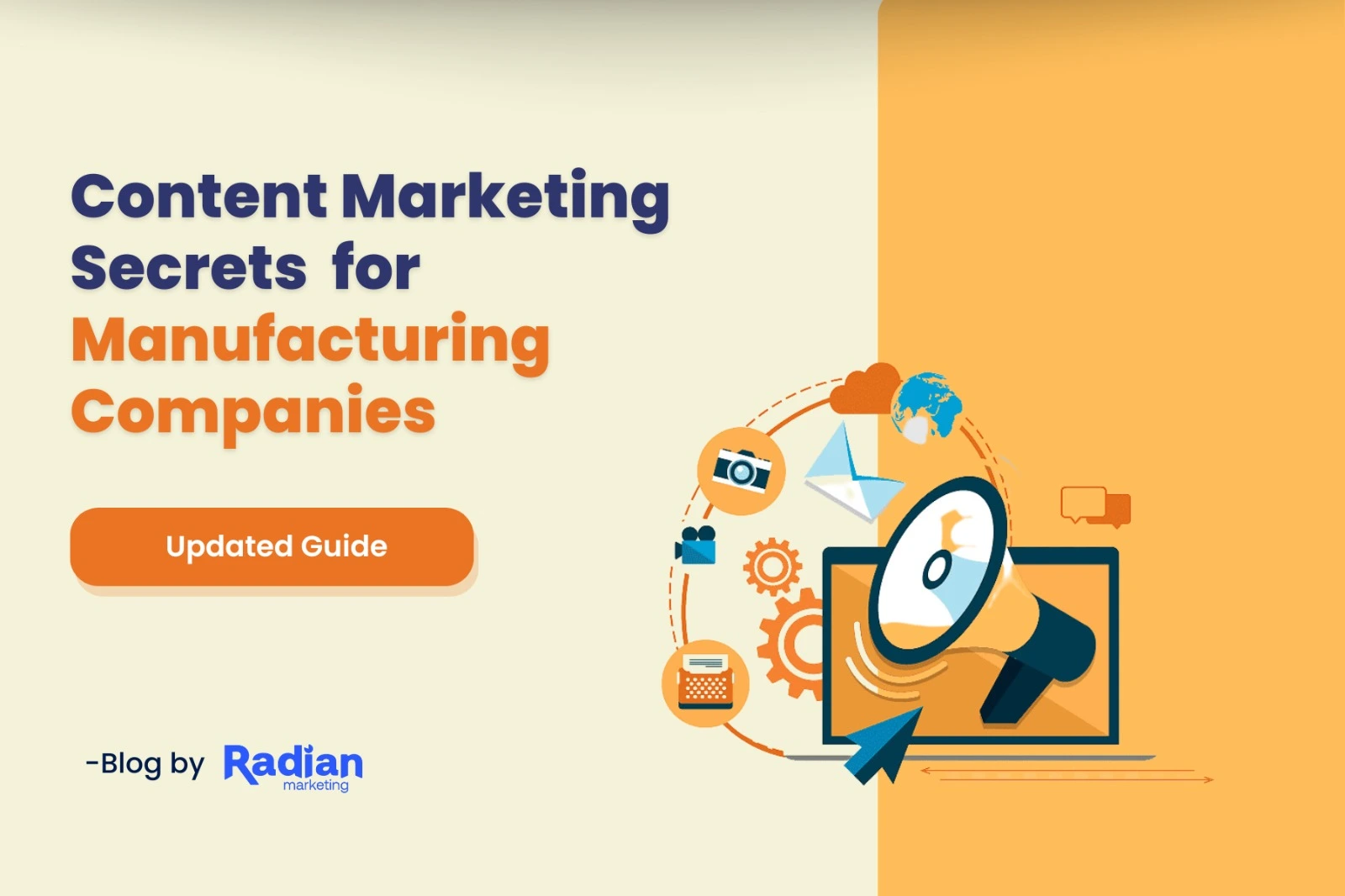Key Takeaways:
1. Content marketing helps manufacturers educate buyers and build trust in complex B2B sales cycles.
2. Valuable content like case studies, technical blogs, and product guides positions companies as industry experts.
3. SEO-driven strategies improve online visibility for niche services and equipment.
4. Targeted content supports both lead generation and nurturing over long buying timelines.
5. A consistent content plan boosts brand credibility and helps shorten sales cycles.
You own a manufacturing company and now you’re looking for content marketing ideas to build online presence, right?
Content marketing is one of the coolest ways to grow digitally and reach your potential customers. So why not do it for your manufacturing business?
Worry not! We’re here to guide and help you become a master at it.
Content marketing is a distinct marketing strategy that attracts and engages potential customers without immediately selling them anything. The process entails developing valuable and relevant content that answers a query, solves a problem, or entertains.
So you’ve realized that your standard growth strategies aren’t working and you’re ready to launch your inbound marketing campaign.
Great!
HubSpot research shows 82% of businesses worldwide invest in content marketing. 47% of purchasers engage with two to five pieces of content before purchasing a product or service. Manufacturing is another large industry that prioritizes content marketing in 2021 and thereafter.
Because of the increase in businesses moving online, traditional marketing strategies have taken a back seat. Industrial businesses like Manufacturers and Construction companies are leveraging content marketing more than ever. 41% of marketers say they have a well-defined industrial content marketing strategy. Nowadays, the greater your market presence, the greater your revenue.
First, let’s know how content marketing works?
Although manufacturing may not seem like the most exciting industry, it is critical to market your company and get noticed.
It can help raise brand awareness, drive traffic to your website, and ultimately attract new customers. It keeps them engaged, and moves them further down the sales funnel by using blogs, eBooks, social media postings, graphics, and videos. Developing content marketing ideas might help your company stay ahead.
Content marketing for manufacturing companies should achieve these three key goals:
Increase client satisfaction.
Developing and nurturing business leads.
Supporting the organization’s aims and success criteria.
Content Marketing ideas for manufacturers + Examples
So, what will you need to attract qualified buyers to your website?
Valuable Content.
The top of the funnel is where you build a relationship with the people who land on your site. This is hopefully through organic SEO and effective SMM and SEM strategies.
Your audience is probably looking for high-level information on specific products and services, answers to inquiries, or a possible solution to a problem they’re having.
To produce more leads for their sales staff, many manufacturing companies are broadening their marketing efforts from just relying on trade shows, print ads, and press releases. Instead, they are boosting digital content marketing.
Concentrate on creating useful, user-friendly material that answers questions that consumers have.
We’ve got you covered if you’re in plan to do something like this but struggling to come up with content ideas for your lead generation plan.
Next, I’ll cover some of the top content marketing ideas to increase website traffic and market your manufacturing company.
Valuable Blog Content

When we say content marketing, blog posts are the first to come to mind. And why not? It’s an effective way of educating prospective buyers.
Secondly, it has many benefits. Simultaneously, it increases your popularity, SEO rankings, and brand authority.
Let’s start with blogging. In order to drive more new visitors to your website, a blog is a key component of a complete lead generation strategy.
Use your blogs to educate your audience that will result in a rise in blog subscriptions and your website visitors. Creating a blog where you post articles related to your product or industry improves your visibility and attracts potential customers. You can design your content for search engine optimization (SEO) to boost organic traffic to your website.

Moreover, other benefits from the blog posts include:
Drive organic reach and traffic to your website
Can be repurposed for social media posts
Helps generate leads and convert
Drives long-term results
Very useful in forging an interpersonal connection with your buyers
Therefore, by having a rich blog post on your website, a manufacturer by using content marketing can speed up the long sales cycle by educating the buyers about complex products. To enhance the productivity of the blog, real data, statistics, and survey results can be used. Hence, blogs can prove to be the most effective manufacturing content marketing strategy in the marketing funnel.
Ebooks

If you want to tackle a topic in more depth than a typical blog post can afford and capture visitor information in the process, an introductory eBook can be an excellent tool.
An e-book is less like a book and more like a long blog post. It provides clients with an in-depth view of a particular subject that relates to your product or industry. They take more time and effort to produce, but you can use each chapter to create other content.
Ebooks are valuable assets in content marketing. They demonstrate your knowledge of the industry and your ability to face any challenges that may arise. They also allow you to discuss other pressure points in the ebook.
The manufacturing industry can benefit from ebooks by discussing manufacturing economics. Because the concept of one size fits all is ruled out, ebooks about buyers’ specific needs in the manufacturing industry can be written.
Engaging Social Media Posts
It’s no surprise that we, as a consumer, immediately pull out their phones to check the products’ social media profiles to gauge their popularity and authenticity.
Most brands use social media to reach out to their ideal customers. And the others will be there soon. Below is the Facebook post by one of the largest Indian FMCG companies, Dabur.
However, the manufacturing and industrial sectors have yet to fully realise social media’s potential. Content marketing ideas for manufacturing cannot be complete without social media promotion.
Here are some helpful tips to include in your social media posts:
Remember to include links to your website/landing pages.
Repurpose your blog and other content on social media.
Make sure you’re posting to your accounts regularly. Consistency is important in content marketing.
Create posts for different platforms based on your target audience. For example, on LinkedIn, you could share corporate and sales content. On Instagram, you could share graphical representations of your products benefits, customer videos, aesthetic stories, manufacturing unit’s behind-the-scenes videos and much more such content.
Keep up with the latest trends and incorporate them into your posts to make them more engaging and enjoyable.
Glossaries and FAQs

Creating a glossary of key terminology and frequently asked questions about your company’s products is a valuable exercise for your sales, marketing, and customer support departments. Working on this together will assist your teams in understanding what issues your clients are facing and what information is required to address them.
FAQs are also beneficial to your website’s organic strategy because your potential clients may look up online. Promote forthcoming webinars, Q&A sessions, or consultation services on these pages.
Insightful Case studies
It is critical to demonstrate the influence you have made on your clients rather than simply discussing it. Use case studies to tell the tale of your clients’ problems and ambitions, your solutions, and the outcomes you achieved.
Credibility is critical, especially for manufacturing and industrial firms. Support your quality standards, customer service promises, and other value propositions through descriptive case studies that contain client testimonials. This will assist your prospects to understand what it is like to work with your organisation.
Case studies can increase brand awareness by providing buyers with a detailed case study of your products’ performance. If nothing else, buyers would respond positively to a demonstration of the product of their choice. According to a HubSpot report, 13% of marketers use case studies as a primary media form in their content strategy.
Furthermore, case studies provide prospective buyers with information about their products’ performance. It helps them become enthusiastic about the product. Case studies are used to demonstrate that the buyer is making a wise decision by purchasing the company’s product.
Visually-appealing Infographics

Infographics are visual representations of valuable data and other information. They’re entertaining and easy for customers, as well as highly cost-effective to produce. B2B companies leverage infographics to present their insights in an attractive way as they’re an easy method to make seemingly uninteresting or complicated information more understandable.
Brochures

Brochures are like rock-beds in the digital content ocean. Online content can sometimes be difficult to understand. But, thanks to brochures, we can take a break without marketing. Brochures are now also available online, indicating that they can do the job regardless of the format.
Brochures, on the other hand, work best after buyers are warmed up. In terms of your products and services. Make your brochure as appealing as possible while remaining formal.
Some key points to remember when incorporating it into your manufacturing content marketing strategy:
Insert a timeline to show how your product was created.
Make data easy to understand by using compelling statistics and figures.
In your brochure, use a colour gradient.
To make your marketing brochure elements, apply a suitable colour filter to pop
Use images and brightly coloured icons to draw attention to calls to action.
Your marketing brochure design should reflect your company’s culture.
Put key takeaways at the end of the brochure to quickly distill the information.
Several industrial enterprises in India have successfully used content marketing to drive growth. Tata Steel, Larsen & Toubro (L&T), Godrej Appliances, and Mahindra Electric are a few examples. These businesses employed a combination of blog articles, videos, social media campaigns, and interactive content to educate their audiences, highlight their ideas, and drive corporate growth.
Why Should Manufacturers Use Content Marketing?
Business-to-business (B2B) enterprises always sell by creating connections. Buyers like to buy on their own terms in today’s fast-paced and highly competitive market. They don’t want to be sold something; they want confirmation of your competence and efficiency. Before clients contact your sales team, you may highlight these capabilities and create trust and loyalty through content.
Every year, content marketing for manufacturing companies becomes more competitive. As per the report – In 2020, the proportion of organizations with mature or sophisticated content marketing strategies has risen from 29% to 39%.
Investing in content marketing allows you to stay current with industry leaders and acquire a competitive advantage over legacy manufacturers. Unlike traditional platforms cluttered with advertisements vying for attention, content-based channels provide a clear pathway to reach your target market.
How To Create an Industrial Content Marketing Strategy

With all the types of content options out there for manufacturers, how do you know where to start? The answer: Start with your customers! Find out what they need, their concerns, and their pain points.
Creating effective, strong content and engaging prospects is so essential to businesses that there are numerous books, webinars and entire conferences dedicated to getting marketing and sales professionals from across the globe up to speed. To help produce content that drives buyers and engineers to learn more about your company’s industrial products and services, make sure to follow the best practices below.
Beyond being the best way to connect with your prospects, content is key (literally) for SEO and improving your positioning across search engines. It also allows you to develop your brand further. Ask yourself: What do you want your business to be known for? What message and tone do you want to convey to your prospects? Who do you want your audience to include?
Begin With A Clear Goal And Plan

Is the end result to get more customers to contact you, or to attract better qualified customers? Do you want to promote your core product line, or build your reputation in a new market? Determining these goals will help you better understand your audience and consequently strengthen your content.
Every growth initiative should have a clear plan. For each new content piece, create an outline of what you will create to guide you in your creative process. If it’s a blog, what SEO keywords will guide the writing? Who is the audience? Which one of your services will it be promoting?
Establish who will create the content, when they will produce it, who will set up your various channels for promotion, etc.
Understand What Your Buyers Need

Content marketing for industries works best when you are not the subject. Speak about the industry, technology, trends and solutions. Aim to help others by educating and entertaining them. Be critical of yourself and your content, and you’ll avoid turning people away with information they can’t relate to.
To create content that is relevant to your audience, put yourself in your customer’s shoes and consider the following:
Does the content answer buyers’ frequently asked questions?
Is this content timely to my audience?
Does the content aim to solve buyers’ problems?
If you cannot identify the answer to those three questions, your content is missing the mark on relevancy. Consider the feedback you get from customers on a day-to-day basis. What problems are they having and coming to you to solve?
Communicate A Real Benefit
Your content must provide a benefit to the audience in some way — communicate it with a clear title.
Writing about something you’re an expert in will up your thought leadership game — and you’re least likely to hit writer’s block. Personalization is essential to a lead generation strategy, so tell a story that shows your audience you understand their world.
Find A Marketing agency Who Understands Your Industry
It can be difficult to find creative people who understand your products and services. If you’re just starting to implement content marketing for your business, it is recommended to build a relationship with an innovative marketing agency to get a better understanding of their strategy that aligns with your business.
If you are planning to spend money on Facebook ads, get to know about our Facebook ads management service instead of burning cash with an inexperienced company.
Manufacturing Industry Content Marketing vs. Other Industries
Content marketing is incredibly adaptable, allowing firms to tailor their methods to their products and marketing objectives. Understanding the differences between content marketing for manufacturers and other industries will help you develop successful company strategies.
Consider the following aspects that distinguish content marketing in manufacturing:
Complex products: Manufacturers’ products and services are frequently more advanced and complex than other industries. Manufacturers must create content that explains these topics in a way that their customers can grasp.
Dry content: Because many aspects of the manufacturing process can appear monotonous, you must devise novel ways to make their material appealing.
Longer sales cycle: Because selecting a manufacturing firm is a critical decision for business executives, the buying cycle is typically longer. To build trust and close a transaction, you’ll need more than one piece of content.
Manufacturers must customize their material to a particular market because manufacturing items are highly specialised.
Experience is required: Years of experience are required to understand your consumers and display the degree of knowledge and efficiency that they need in a manufacturer.
Frequently Asked Questions?
The goal of content marketing is to provide value to potential customers, build brand awareness, and ultimately drive profitable customer action. The content is typically hosted on your company's website or blog and can be shared across different channels.
While Social Media marketing involves leveraging social media platforms to promote products, services, or content and engage with the target audience. It encompasses activities like creating and sharing posts, running paid advertisements, responding to comments and messages, and fostering a sense of community around your brand.



(3) Comments